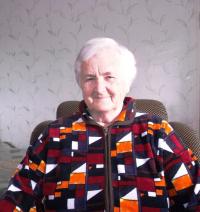It was the same in the villages everywhere
Marie Koval (née Hrachová) is a Czech native from northern Caucasus. She was born in 1935 in Varvarovka near Anapa in a Czech family. Her brother Venoušek died when he was five years old. She worked in a kolkhoz in Varvarovka, and then she married a Ukrainian from Kirillovka. She stayed at home raising her children there for four years, afterwards she worked as a train conductor and then as a laboratory technician in a fuel depot for the following thirty years. From the stories of her grandmother, who came from Brno, and her mother she knows a lot about the history of the Czech community near Anapa and Novorossiysk and she herself witnessed many events from the period of WWII and the following years. She speaks the Czech dialect fluently and she adheres to her Catholic faith, although her children were baptized in the Geek Orthodox Church and they do not speak Czech.

